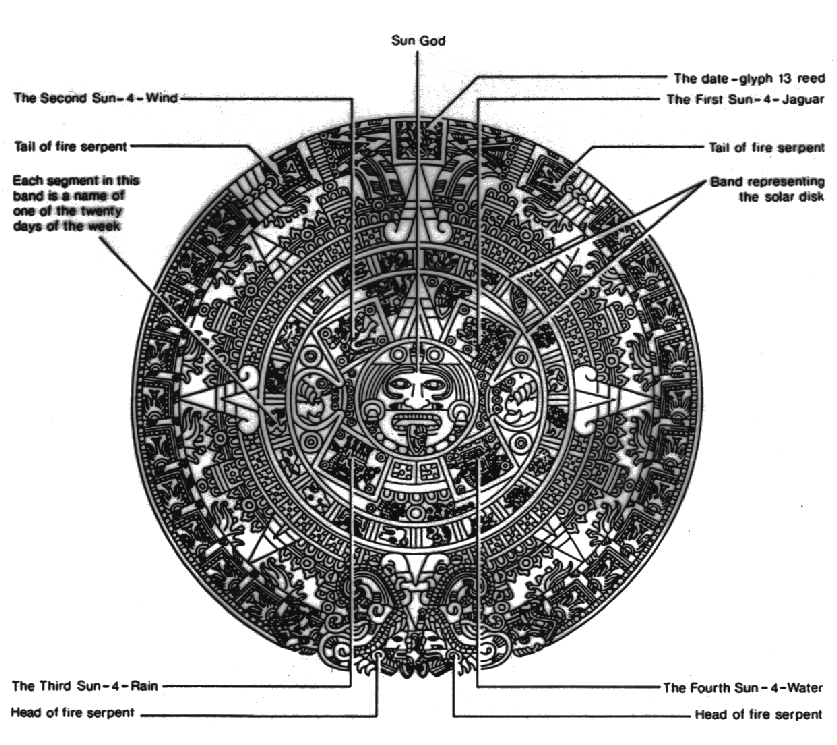How To Read The Aztec Calendar
How To Read The Aztec Calendar - How to read an aztec calendar. A reading of the significance of a day. It provided a framework for understanding the natural world. The calendar was central to aztec life, guiding agricultural practices, religious ceremonies, and social events. The aztec calendar, known as the sun stone or the stone of the five eras, is a complex system of hieroglyphic symbols that reflect the cosmological beliefs and religious practices of the. It was a vital element of aztec culture and society.
Each day in the calendar was given a unique combination of a name and a number. It was a vital element of aztec culture and society. The calendar was central to aztec life, guiding agricultural practices, religious ceremonies, and social events. The aztec calendar, known as the sun stone or the stone of the five eras, is a complex system of hieroglyphic symbols that reflect the cosmological beliefs and religious practices of the. The aztec calendar, a profound and complex system, served as more than just a method of tracking time;
It is one of the mesoamerican calendars, sharing the basic structure of calendars from throughout the region. After reading about the aztec god tezcatlipoca, learn all about mictlantecuhtli , the aztec god of the. How to read an aztec calendar. Unlike modern calendars that focus primarily on linear time measurement, the aztec system viewed time as a cyclical and interconnected.
Each day in the calendar was given a unique combination of a name and a number. Unlike modern calendars that focus primarily on linear time measurement, the aztec system viewed time as a cyclical and interconnected phenomenon with profound spiritual significance. The aztecs used a sacred calendar known as the tonalpohualli or “counting of the. It provided a framework for.
The aztec calendar, a profound and complex system, served as more than just a method of tracking time; The calendar comprises two interlocking systems: Unlike modern calendars that focus primarily on linear time measurement, the aztec system viewed time as a cyclical and interconnected phenomenon with profound spiritual significance. Each day in the calendar was given a unique combination of.
How to read an aztec calendar. There are two primary calendars within the aztec system: Thus, the aztec empire — and the worship of tezcatlipoca — came to an end. It provided a framework for understanding the natural world. The calendar comprises two interlocking systems:
It provided a framework for understanding the natural world. How to read an aztec calendar. The calendar comprises two interlocking systems: Find a date in the tonalpohualli, the sacred calendar of the mexica, the aztecs of mexico. The aztec sun stone, often erroneously called the calendar stone, is on display at the national museum of anthropology in mexico city.
How To Read The Aztec Calendar - In addition, both individual days and periods of days were given their own gods in the. The calendar was central to aztec life, guiding agricultural practices, religious ceremonies, and social events. The aztecs used a sacred calendar known as the tonalpohualli or “counting of the. For the aztecs, specific times, dates and periods, such as one’s birthday for example, could have an auspicious (or opposite) effect on one’s personality, the success of harvests, the prosperity. The xiuhpohualli, or solar calendar, of 365 days, and the tonalpohualli, or ritual calendar, of 260. It provided a framework for understanding the natural world.
Each day in the calendar was given a unique combination of a name and a number. In addition, both individual days and periods of days were given their own gods in the. There are two primary calendars within the aztec system: The calendar comprises two interlocking systems: Find a date in the tonalpohualli, the sacred calendar of the mexica, the aztecs of mexico.
The Aztec Sun Stone, Often Erroneously Called The Calendar Stone, Is On Display At The National Museum Of Anthropology In Mexico City.
For the aztecs, specific times, dates and periods, such as one’s birthday for example, could have an auspicious (or opposite) effect on one’s personality, the success of harvests, the prosperity. The calendar comprises two interlocking systems: Unlike modern calendars that focus primarily on linear time measurement, the aztec system viewed time as a cyclical and interconnected phenomenon with profound spiritual significance. The aztecs used a sacred calendar known as the tonalpohualli or “counting of the.
It Is One Of The Mesoamerican Calendars, Sharing The Basic Structure Of Calendars From Throughout The Region.
The xiuhpohualli, or solar calendar, of 365 days, and the tonalpohualli, or ritual calendar, of 260. In addition, both individual days and periods of days were given their own gods in the. It was a vital element of aztec culture and society. A reading of the significance of a day.
Azteccalendar.com Provides A Reading Of The Significance Of Any Given Day And Presents The Relevant Gods Or Protectors According To The Aztec And Mayan Calendar.
The aztec calendar, a profound and complex system, served as more than just a method of tracking time; It provided a framework for understanding the natural world. After reading about the aztec god tezcatlipoca, learn all about mictlantecuhtli , the aztec god of the. It is significant that most major aztec monuments and artworks conspicuously carry a date of some kind.
The Aztec Calendar, Known As The Sun Stone Or The Stone Of The Five Eras, Is A Complex System Of Hieroglyphic Symbols That Reflect The Cosmological Beliefs And Religious Practices Of The.
The aztec calendar is actually a system of 2 calendars: The calendar was central to aztec life, guiding agricultural practices, religious ceremonies, and social events. Find a date in the tonalpohualli, the sacred calendar of the mexica, the aztecs of mexico. Thus, the aztec empire — and the worship of tezcatlipoca — came to an end.




